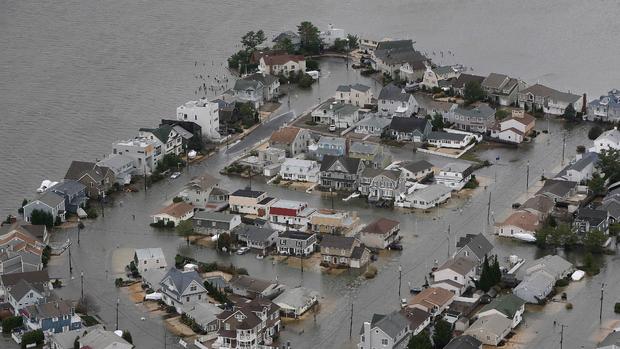What to watch for when buying a hurricane-damaged home
(MoneyWatch) Buying a hurricane-damaged home can mean big savings -- and big headaches if you don't take the old adage "buyer beware" to heart.
A year after Superstorm Sandy barreled through the Northeast, renovated and refurbished homes are hitting the market and selling. For Elaine Patterson, a licensed broker with Douglas Elliman Real Estate in Sandy-struck Massapequa, N.Y., the storm changed the dialogue of home buying.
"The question you would always hear when somebody walked through the door was, 'How long has the house been on the market?' which isn't even all that relevant anyway,"' Patterson said. "But now, more often than not, that question has been replaced with, 'Has this home been affected by Sandy?"
, but it's the water damage you really have to worry about as a buyer. Real estate agents and homeowners should reveal when a home has been damaged by flooding, so you will know right off the bat when you're buying a Sandy-damaged home. But if you know an area has been damaged by a water or windstorm, and there is nothing mentioned on the listing sheet, be sure to ask outright.
Ask the right questions
The next step is to dig in and understand exactly how much damage was caused and what kind of repairs have been made to the property:
- Was the home flooded?
- How much water came in? How long was the water sitting in the home?
- What kind of damage was done, and how was it fixed?
- Was the home completely stripped down to the skeleton, or were the walls simply washed, bleached, and repainted?
- Was the home thoroughly cleaned and sprayed for mold, and can the homeowners produce receipts or work orders detailing what was done?
- Was the wiring checked for corrosion due to salt water infiltration?
- Was the framing (typically wood is used) checked for any signs of rot?
- Were the necessary permits pulled for all this work?
Get an inspection
While you'll want to hire an excellent home inspector, bear in mind that a typical home inspection simply won't cut it for a home damaged by water.
"Typically, a home inspection is a process where the inspector looks at things that are readily visible," said Claude McGavic, executive director of the National Association of Home Inspectors. "They're not allowed to take walls apart and look inside and that's a problem, because it's easy to cover up something like mold with a coat of paint. Even a good inspector can't detect [mold] if it's inside the walls."
Tackle mold
Mold is the scariest problem that could be lurking inside a flood-damaged home. Just because you can't see mold doesn't mean you can't breathe it in. And invisible mold spores could threaten the health of everyone living in the house unless it was properly dealt with at the time of the flooding.
"You want to get permission from the seller to do some intrusive investigation, poking holes in the walls, and that's more likely be done by a licensed industrial hygienist," he said.
McGavic recommends going for the industrial hygienist over a mold inspector, because industrial hygienist certification is much more rigorous.
"If it looks like a nice house and the price is right, there's probably a reason the price is right, so have someone who has legitimate credentials do some invasive testing to make sure there's no mold present," he said.
Look out for dry rot
The hygienist or a rot and pest inspector should also look for dry rot, which is the rotting of wood caused by a fungus. That could spread to other parts of the home and weaken the home's entire framework over time.
Beware of corrosion
Hurricane flooding is more problematic for a home than freshwater flooding because the salt can eat away at metals. That means that all the wiring inside the home is particularly vulnerable.
"If the house has electrical wiring exposed to salt water, that wiring could be corroded and corroded wires cause house fires," McGavic said. "It would take an electrician to fix that and a good one wouldn't want to fix it. They would replace that."
Electrical outlets that were underwater and any wires leading to them should be replaced; and if any of the heating and cooling units were underwater, they too could have corrosion and rust issues.
Ask about flood zoning and flood insurance
Since Sandy, Patterson noticed that most of the people looking at homes in Massapequa want to know about the elevation. Some areas are more prone to the coastal flooding associated with a hurricane than others, even ones a few streets apart.
Before you make an offer, be sure to ask about flood zoning and flood insurance. Ask the homeowners or listing agent what they know about the flood zone and then ask how much they pay for flood insurance. You can also find most of that information independently by talking to homeowners' insurance agent, which you should do given the new rules about flood insurance being implemented this year.
